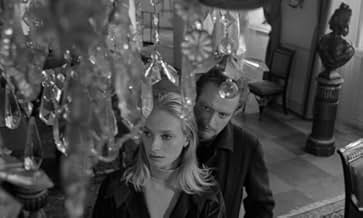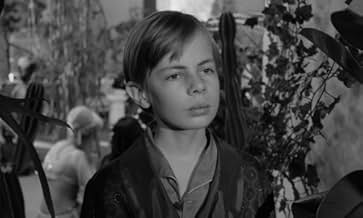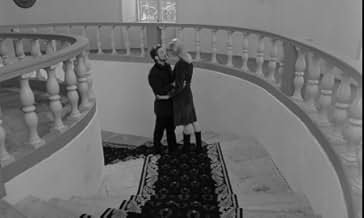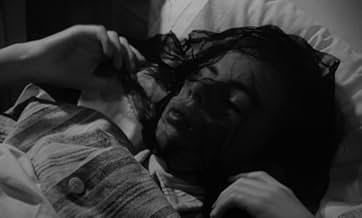PUNTUACIÓN EN IMDb
6,3/10
861
TU PUNTUACIÓN
Añade un argumento en tu idiomaThe story about a man who's trying to get rid of memories from his past. He grew up in an upper-class family in a castle and now revisits the castle with his fiancee.The story about a man who's trying to get rid of memories from his past. He grew up in an upper-class family in a castle and now revisits the castle with his fiancee.The story about a man who's trying to get rid of memories from his past. He grew up in an upper-class family in a castle and now revisits the castle with his fiancee.
- Dirección
- Guión
- Reparto principal
- Premios
- 1 premio y 1 nominación en total
Cleo Boman
- Festdeltagare
- (sin acreditar)
Arne Domnérus
- Orkesterledare
- (sin acreditar)
Monique Ernstdotter
- Festdeltagare
- (sin acreditar)
Reseñas destacadas
Night Games is 2h02 long. Please don't waste these precious hours of your life on this movie!
The black and white photography and the framing and editing of the film are impressive. Thereafter, it's all downhill, I regret.
A deranged mother alternately pushing her son away and keeping him close ( a bit too close for audience comfort). OK, they mess you up your mum (and dad) ...., but this takes far too long to make the point.
One found it difficult to care about the damaged goods of a son, and what were all these orgy-grotesque Fellini film types doing padding the running type out? A film, additionally, about western decadence probably? But, Oh, dear!
I admired Mai Zetterling as an actress in the 50s and 60s, and, more generally, in her wish to transcend stereotyped views of beautiful Swedish (and other national) actresses - from behind the camera.
Night Games is, however, a pretentious failure.
The black and white photography and the framing and editing of the film are impressive. Thereafter, it's all downhill, I regret.
A deranged mother alternately pushing her son away and keeping him close ( a bit too close for audience comfort). OK, they mess you up your mum (and dad) ...., but this takes far too long to make the point.
One found it difficult to care about the damaged goods of a son, and what were all these orgy-grotesque Fellini film types doing padding the running type out? A film, additionally, about western decadence probably? But, Oh, dear!
I admired Mai Zetterling as an actress in the 50s and 60s, and, more generally, in her wish to transcend stereotyped views of beautiful Swedish (and other national) actresses - from behind the camera.
Night Games is, however, a pretentious failure.
There is a reason why this film is unknown and forgotten. "Nattlek" is quite bad. It is not as good as Mai Zetterling's "Älskande Par" or "the Girls" (which I consider as the best Swedish film ever made).
I was looking forward to seeing this film. It was released on DVD in Sweden, so I jumped at the chance to watch it. It sounded good, or at least interesting. Ingrid Thulin, who was always a good actress, was typecast here as a neurotic mother to a little boy, (reminds me of the decadence in "the Damned" by Visconti). When the boy is an adult he takes with him his girlfriend to the castle where he grew up and they face his childhood demons.
The girlfriend played by fresh faced Lena Brundin gives the film some humanity but she has to play opposite Keve Hjelm who is very dull and plays his role in the pretentious acting style people back then thought was serious and worthy. Famous Swedish jazz singer Monica Zetterlund livens things up but has a too brief part in this film.
Crazy party guests and relatives try to give the film a feeling of Fellini and Bergman without any feeling or depth. Borrowing fashionable ingredients from other films does not an art-house classic make. The film is interesting to watch as a document of its time. The arty psychodrama films went out of style. This type of film killed itself.
I was looking forward to seeing this film. It was released on DVD in Sweden, so I jumped at the chance to watch it. It sounded good, or at least interesting. Ingrid Thulin, who was always a good actress, was typecast here as a neurotic mother to a little boy, (reminds me of the decadence in "the Damned" by Visconti). When the boy is an adult he takes with him his girlfriend to the castle where he grew up and they face his childhood demons.
The girlfriend played by fresh faced Lena Brundin gives the film some humanity but she has to play opposite Keve Hjelm who is very dull and plays his role in the pretentious acting style people back then thought was serious and worthy. Famous Swedish jazz singer Monica Zetterlund livens things up but has a too brief part in this film.
Crazy party guests and relatives try to give the film a feeling of Fellini and Bergman without any feeling or depth. Borrowing fashionable ingredients from other films does not an art-house classic make. The film is interesting to watch as a document of its time. The arty psychodrama films went out of style. This type of film killed itself.
Jan (Keve Hjelm) fights impotence (literal and symbolic) and anguished childhood memories in a decadent Swedish castle where risqué parties and daring scenes defy 1960s' movie censorship, reaffirming the ground-breaking role of Swedish films in helping advance adult, sexually concerned themes in international cinema (q.v. Bergman's "Through a Glass Darkly", "The Silence" and "Persona", Vilgot Sjöman's "My Sister My Love/ Syskonbädd 1782" and "I am Curious Yellow", etc). "Night Games" includes a bold flashback scene of Jan as a child (sensitive Jörgen Lindström, who played the young boy in Bergman's "The Silence") caught masturbating.
Former Swedish star Mai Zetterling's third directorial effort is particularly interesting for atmosphere, decors and cast, but the film is heavily depressing and the rather obvious symbolisms have dated badly. Sphynx-like, marvelous Ingrid Thulin has a field day as the bitchy and sensuous mother; Keve Hjelm is engagingly honest in a role that requires bravado and emotional range. The film is influenced by Bergman's "angst" films but also has an expressionist touch to it, because of Rune Ericson's camera-work and experiments with different lenses.
If you like films with decadent-bourgeois flavor and angst-filled characters, this is for you. Of course, it's also a must for Ingrid Thulin fans, but it's probably a very difficult film to find these days. My vote: 6 out of 10.
Former Swedish star Mai Zetterling's third directorial effort is particularly interesting for atmosphere, decors and cast, but the film is heavily depressing and the rather obvious symbolisms have dated badly. Sphynx-like, marvelous Ingrid Thulin has a field day as the bitchy and sensuous mother; Keve Hjelm is engagingly honest in a role that requires bravado and emotional range. The film is influenced by Bergman's "angst" films but also has an expressionist touch to it, because of Rune Ericson's camera-work and experiments with different lenses.
If you like films with decadent-bourgeois flavor and angst-filled characters, this is for you. Of course, it's also a must for Ingrid Thulin fans, but it's probably a very difficult film to find these days. My vote: 6 out of 10.
Pauline Kael called this movie a combination of "the worst of Fellini and the worst of Bergman," and glib as that sounds, she's right--it exactly locates the leading pretensions of the era's art cinema flavors, and combines them in a particularly superficial and flashy way that lacks either great director's depth, originality or humor. The rather confused structure interweaves past and present as the grown heir to a country estate brings his fiancee there, where he recalls his difficult childhood being alternately amused, abused and ignored by self-absorbed parents. The latter use their wealth and privilege to be kingpins of a cartoonishly decadent social scene. But the film isn't satire--we're meant to take its grotesques very seriously as some statement about, you know, Society, though they only resemble figures from other movies. At the end we're apparently to understand that the present-day characters have somehow been liberated from the chains of the past, but that catharsis rings hollow, particularly since those characters are just as one-dimensional as the wealthy sinners in the flashbacks.
Zetterling's other directorial movies are said to be good, so maybe this was just her auteurist folly, all too obviously derivative of other auteurs' follies. But the imitative quality robs of it any genuine emotion, or even pleasure in flamboyance, though it's well-shot and edited. There's some nudity, a scene about (though not graphically depicting) masturbation, and other content that must have seemed terribly shocking in 1966. (Indeed, the film's most lasting notoriety came from Shirley Temple Black having quit a festival jury in a highly publicized huff over the inclusion of this "pornography." Little did she know how much more pornographic movies would get, or how soon.) But the problem here is that there's nary a single moment that feels organic--everything is trying so HARD to be "shocking." Which pretty much kills any shock value, at least for me.
Anyway, it's a garish, self-important but empty-headed effort that was never a good movie, but now serves as a vivid time capsule of just how merrily (and self-consciously) taboos were being freshly broken at the time of its making. Somehow the overstaged quasi-orgies and such aren't much fun, even without the equally bogus "But think about the child!!" hand-wringing accompanying them. But if you wanna see a personification of what was then called (among other things) "the New Permissiveness," this is it, in a nutshell. Of COURSE Shirley Temple was appalled. You can practically sense the filmmakers congratulating themselves that she would be.
Zetterling's other directorial movies are said to be good, so maybe this was just her auteurist folly, all too obviously derivative of other auteurs' follies. But the imitative quality robs of it any genuine emotion, or even pleasure in flamboyance, though it's well-shot and edited. There's some nudity, a scene about (though not graphically depicting) masturbation, and other content that must have seemed terribly shocking in 1966. (Indeed, the film's most lasting notoriety came from Shirley Temple Black having quit a festival jury in a highly publicized huff over the inclusion of this "pornography." Little did she know how much more pornographic movies would get, or how soon.) But the problem here is that there's nary a single moment that feels organic--everything is trying so HARD to be "shocking." Which pretty much kills any shock value, at least for me.
Anyway, it's a garish, self-important but empty-headed effort that was never a good movie, but now serves as a vivid time capsule of just how merrily (and self-consciously) taboos were being freshly broken at the time of its making. Somehow the overstaged quasi-orgies and such aren't much fun, even without the equally bogus "But think about the child!!" hand-wringing accompanying them. But if you wanna see a personification of what was then called (among other things) "the New Permissiveness," this is it, in a nutshell. Of COURSE Shirley Temple was appalled. You can practically sense the filmmakers congratulating themselves that she would be.
The film, which premiered at the 27th Venice International Film Festival, caused so much controversy at the time that the Venice jury had to watch the film in a special room.
The name of the film at the center of all these discussions is Jörgen Lindström, who started his cinema career at the age of 9 and starred in 4 films that went down in golden letters in the history of cinema, three of which were directed by Ingmar Bergman. He left the cinema at the age of 12 and started editing films after university.
I mean, it's very difficult to shoot this movie today.
Swedish cinema consists of cinema workers who love to walk successfully on a tight rope...
The name of the film at the center of all these discussions is Jörgen Lindström, who started his cinema career at the age of 9 and starred in 4 films that went down in golden letters in the history of cinema, three of which were directed by Ingmar Bergman. He left the cinema at the age of 12 and started editing films after university.
I mean, it's very difficult to shoot this movie today.
Swedish cinema consists of cinema workers who love to walk successfully on a tight rope...
¿Sabías que...?
- CuriosidadesFormer child star Shirley Temple quit the board of the San Francisco Film Festival to protest its decision to show Nattlek (Night Games). She regarded it as pornography.
- ConexionesFeatured in Vielleicht bin ich wirklich eine Zauberin (1989)
- Banda sonoraMarch (from 'Music for the Funeral of Queen Mary') in C minor, Z. 780
Composed by Henry Purcell (1695)
Selecciones populares
Inicia sesión para calificar y añadir a tu lista para recibir recomendaciones personalizadas
- How long is Night Games?Con tecnología de Alexa
Detalles
- Fecha de lanzamiento
- País de origen
- Idiomas
- Títulos en diferentes países
- Night Games
- Localizaciones del rodaje
- Roslagen, Uppland, Suecia(province where the action is set)
- Empresa productora
- Ver más compañías en los créditos en IMDbPro
- Duración1 hora 45 minutos
- Color
- Relación de aspecto
- 1.66 : 1
Contribuir a esta página
Sugerir un cambio o añadir el contenido que falta

Principal laguna de datos
What is the Spanish language plot outline for Juegos de noche (1966)?
Responde





























